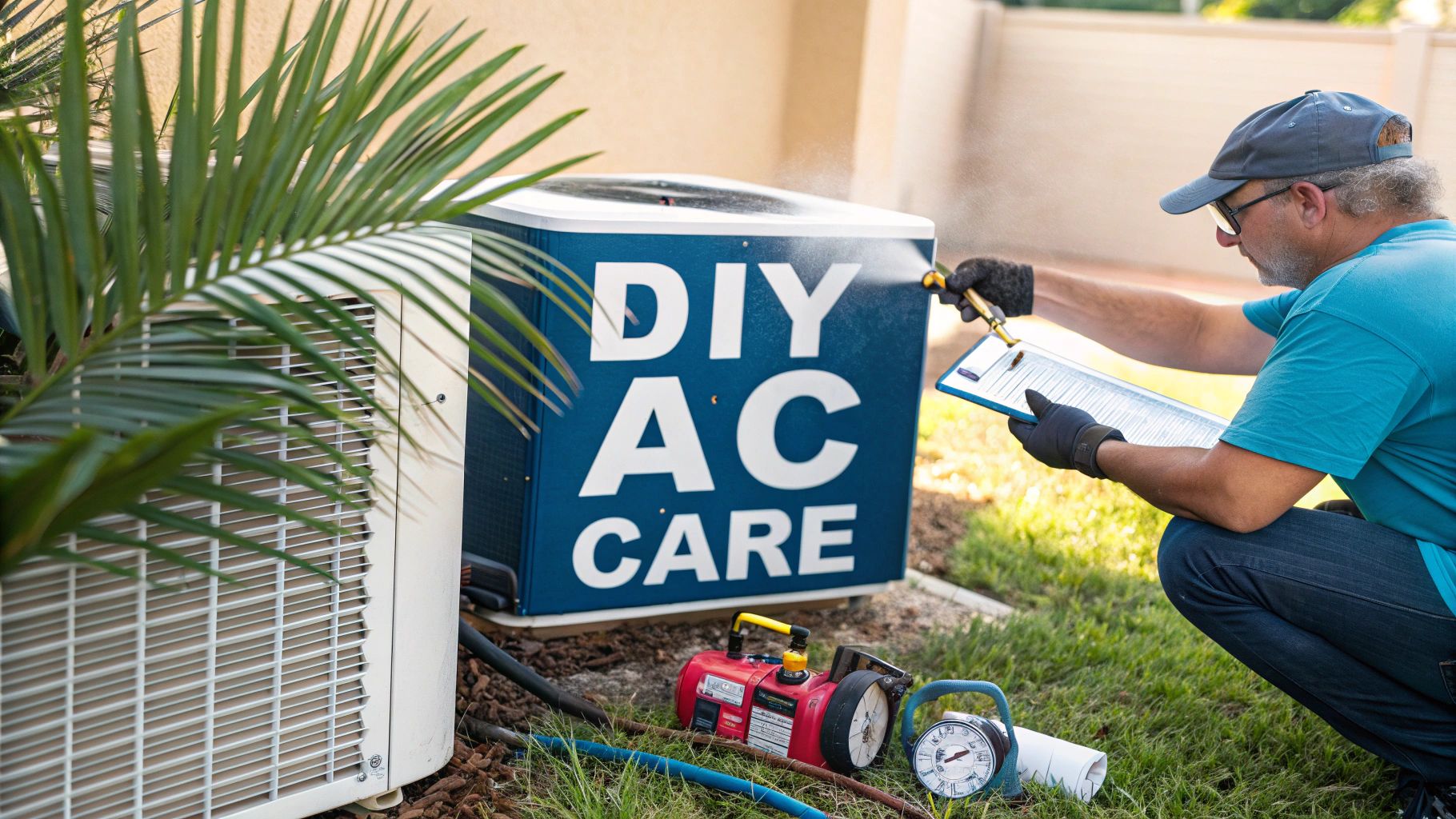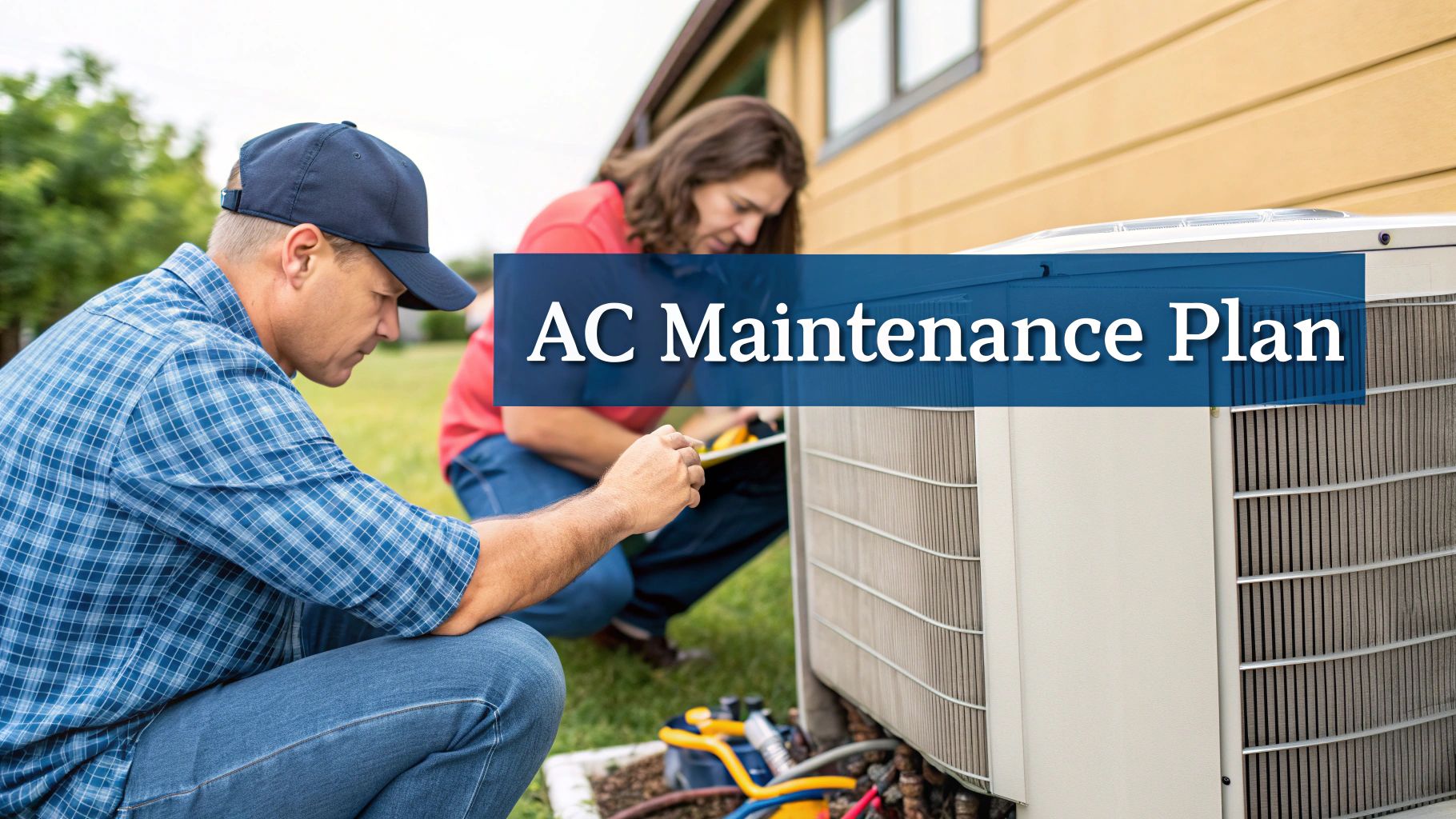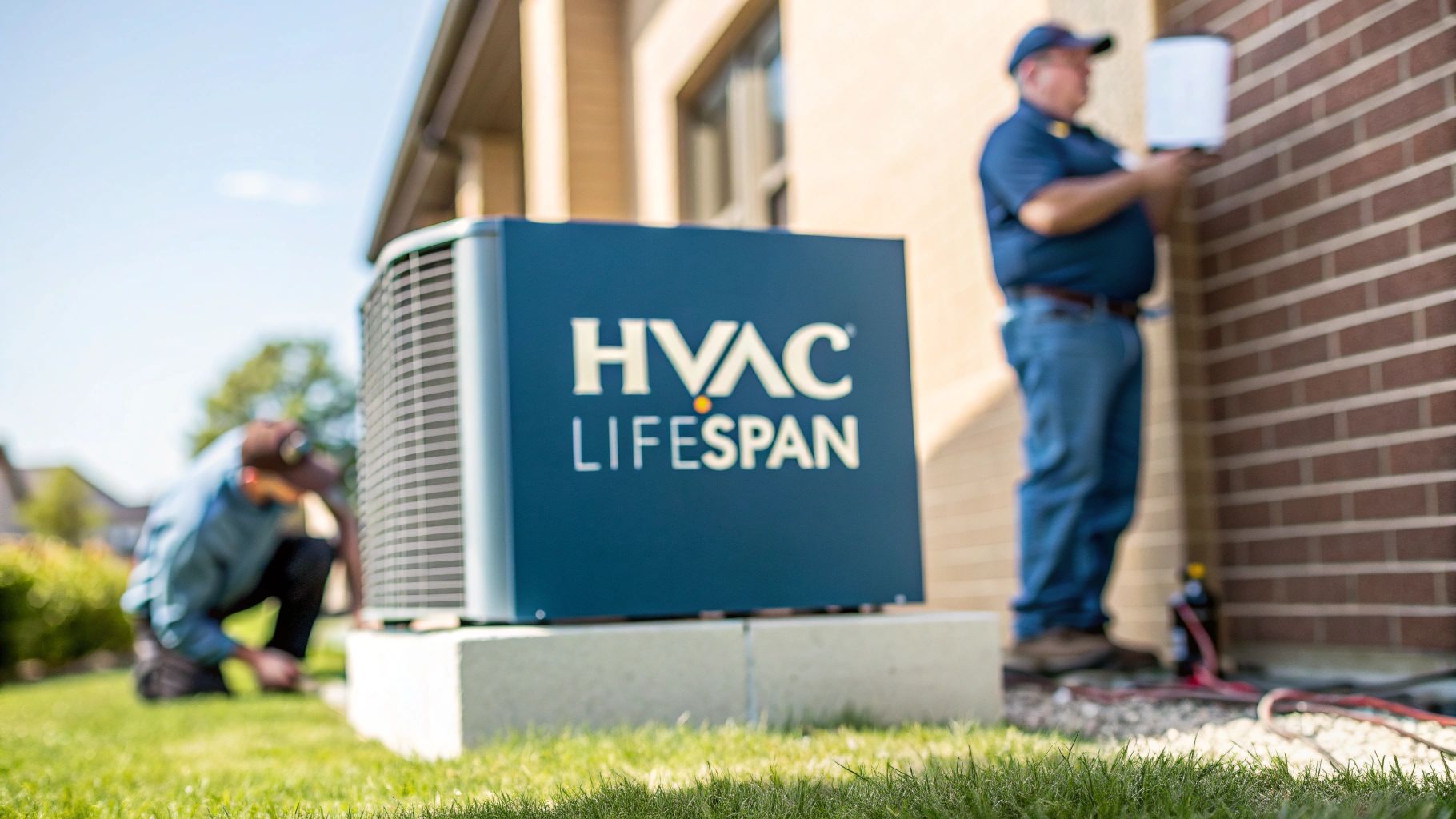In Florida, skipping regular air conditioner maintenance isn't really an option. For your system to last and run efficiently, you need a solid game plan. This means doing some monthly DIY checks like changing filters and, crucially, scheduling professional tune-ups twice a year. I always tell homeowners to book one in the spring before the brutal heat hits, and another in the fall to help the unit recover from its summer marathon.
Trust me, this proactive approach is the best thing you can do to avoid a nightmare scenario—like your AC giving up on a sweltering July afternoon.
Your Florida AC Maintenance Checklist
Let's be honest: Florida’s climate is an absolute torture test for an air conditioner. The relentless heat, the soupy humidity, and the salty air for those near the coast mean our units work harder than just about anywhere else. If you neglect maintenance, you're not just taking a risk; you're practically guaranteeing higher power bills, weak cooling, and a much shorter life for your equipment.
The best strategy for air conditioner maintenance florida is a mix of simple things you can easily do yourself and the more technical inspections that are best left to a pro. Think of it as a partnership. You handle the consistent, simple upkeep, and your technician performs the deep dive that catches big problems while they're still small.
This checklist is built from the ground up for the unique challenges we face here in the Sunshine State.
Here's a great visual that breaks down the three core pillars of keeping your Florida AC in fighting shape.
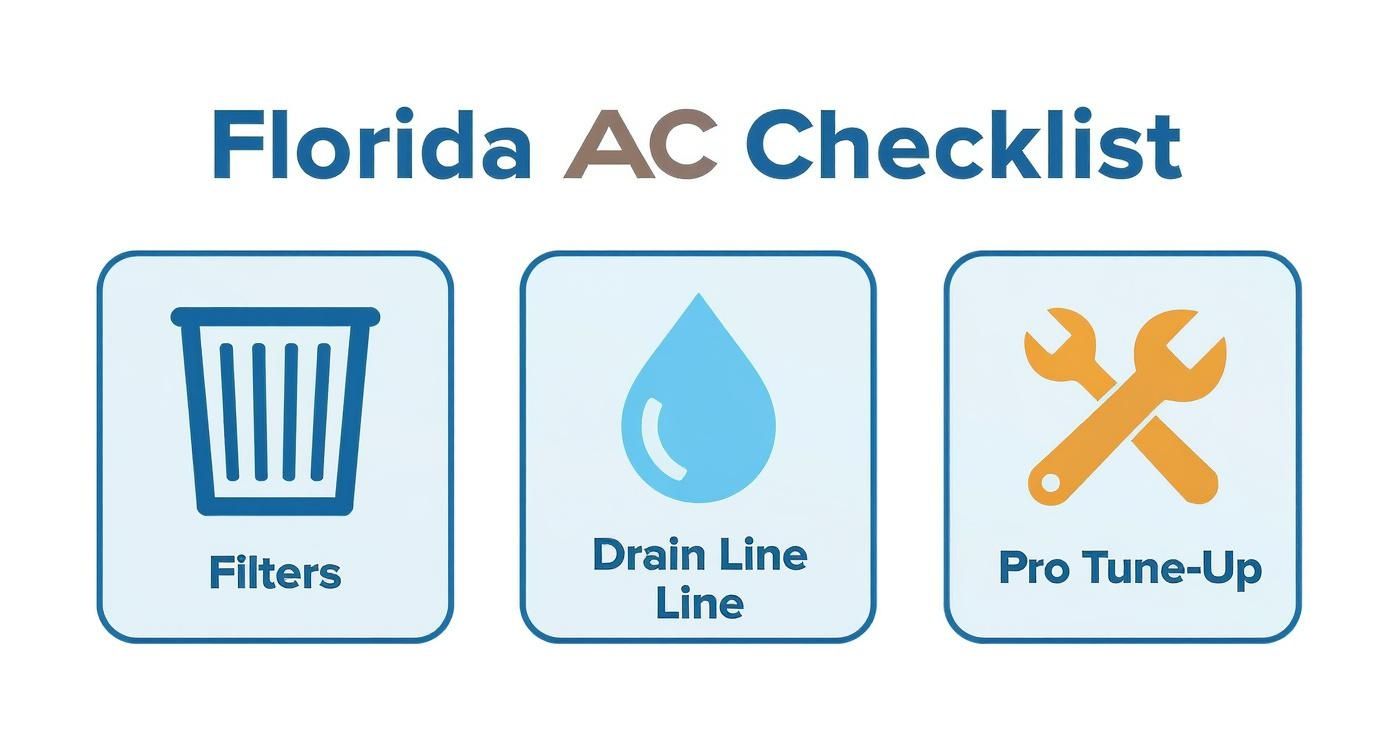
As you can see, it all comes down to three things: clean airflow, clear drainage, and getting a pro's eyes on it regularly.
To simplify this, here's a quick reference table breaking down the what, when, and why for Florida homeowners.
Florida AC Maintenance At a Glance
| Task | Frequency | Who Should Do It | Why It Matters in Florida |
|---|---|---|---|
| Change/Clean Air Filter | Every 30-60 days | Homeowner | Prevents dust, pollen, and humidity from choking airflow and overworking your system. |
| Clear Outdoor Unit | Monthly | Homeowner | Ensures palm fronds, grass, and dirt don't block heat transfer, causing overheating. |
| Check Condensate Line | Monthly | Homeowner | Prevents algae/mold clogs that lead to water damage—a huge risk in our humid climate. |
| Full System Tune-Up | Twice a Year (Spring & Fall) | HVAC Professional | Deep cleaning, refrigerant check, and electrical safety inspection to prevent breakdowns. |
Following this schedule is the single best way to protect your investment and keep your home comfortable year-round.
Monthly DIY Tasks
These are the quick and easy wins you can knock out in a few minutes each month. Don't blow them off—they prevent the most common, and often most frustrating, AC issues.
- Inspect and Replace Air Filters: A clogged filter is your AC's worst enemy, hands down. Here in Florida, with all the dust, pollen, and humidity, you need to be checking your filter every 30 days. No excuses. A dirty filter makes your system gasp for air, which drives up energy bills and puts a huge strain on the motor. If you're not sure which ones to buy, our guide on https://floridacoolinggroup.com/filters-for-air-vents-in-home/ is a great place to start.
- Clear Debris from the Outdoor Unit: Your outdoor unit (the condenser) is designed to push heat out of your home. It can’t do its job if it's suffocating under a blanket of palm fronds, grass clippings, or caked-on dirt. Do a quick walk-around and make sure you have at least a two-foot bubble of clear space around the entire unit.
I always say, the most expensive AC repair is the one that could have been prevented with a five-dollar filter. A little bit of consistent, simple maintenance is your best defense against a massive, unexpected bill.
Biannual Professional Tune-Up
Twice a year, it's time to call in the cavalry. Your spring and fall tune-ups are when a trained technician can spot things you can't. They have the specialized tools and, more importantly, the experience to perform checks that go way beyond just swapping a filter. If you want to see just how detailed these check-ups can get, this ultimate HVAC preventative maintenance checklist gives a great overview of what a true professional looks for.
A proper tune-up isn't just a quick look-see. It should always include these critical steps:
- Checking refrigerant levels to ensure proper cooling capacity.
- Deep cleaning the evaporator and condenser coils.
- Inspecting all electrical components for wear and tear.
- Flushing the condensate drain line to prevent clogs and water damage.
- Calibrating the thermostat for accurate temperature readings.
Here are a few straightforward maintenance tasks you can tackle yourself that will make a world of difference for your AC's performance and lifespan. You don't need to be a pro to handle these jobs. Just spending a few minutes each month can go a long way in supporting the more heavy-duty work your technician does during a tune-up.
This is the ground-level air conditioner maintenance Florida homeowners can, and should, master. Honestly, these quick checks prevent some of the most common—and frustrating—service calls we get, saving you a headache and some cash.
Master the Monthly Air Filter Swap
In Florida, a clean air filter isn't just a suggestion; it's absolutely essential. Between the pollen, dust, and constant humidity, your filter is fighting a tough battle. Once it gets clogged, it practically suffocates your system.
A dirty filter forces your AC to work much harder to pull in air. That means higher energy bills and a ton of unnecessary strain on critical parts like the blower motor.
For most homes around here, checking the filter every 30 days is the golden rule. Got pets or live near a construction site? You’ll probably want to check it even more often. A fresh filter is a win-win: it boosts your AC's efficiency and cleans up the air you breathe indoors.
Clear Your Condensate Drain Line
That legendary Florida humidity means your air conditioner is constantly pulling moisture out of the air. This water has to go somewhere, and it exits through a small PVC pipe called the condensate drain line. The problem is, that dark, damp pipe is the perfect breeding ground for mold and algae.
Eventually, that gunk can form a nasty clog, causing water to back up and overflow. Trust me, you don't want that mess. It can lead to serious water damage inside your home.
Here’s a ridiculously easy way to keep it clear:
- Find the drain line access point. It's usually a T-shaped pipe with a cap, located near your indoor air handler.
- Once a month or so, pour about a cup of distilled vinegar down the line. Vinegar is great for killing off any sludge and buildup before it gets out of hand.
- After letting it sit for a bit, flush it out with some water.
A five-dollar jug of vinegar can prevent a thousand-dollar water damage repair bill. This is easily one of the most impactful DIY tasks you can do, especially in our climate where these clogs form fast.
Keep the Outdoor Unit Clean and Clear
Your outdoor unit—the condenser—is the workhorse that dumps all the heat from inside your house back outside. For it to do its job right, it needs plenty of room to breathe. But here in Florida, it's constantly getting bombarded with grass clippings, palm fronds, and dirt from our famous downpours.
Get in the habit of doing a quick visual check every few weeks.
- Trim back any bushes, vines, or weeds that are getting too close. You want at least two feet of clear space all the way around the unit.
- Gently spray down the exterior fins with a regular garden hose to knock off any caked-on grime. Never use a pressure washer! The high-pressure stream can easily bend and damage the delicate aluminum fins.
A clean condenser runs cooler, uses less energy, and lasts longer. While a gentle rinse helps the outside, getting the inside of the coils truly clean is a bit more involved. For a more detailed walkthrough on that, check out our guide on how to clean air conditioning coils.
Why Your Florida AC Unit Is Living on Borrowed Time
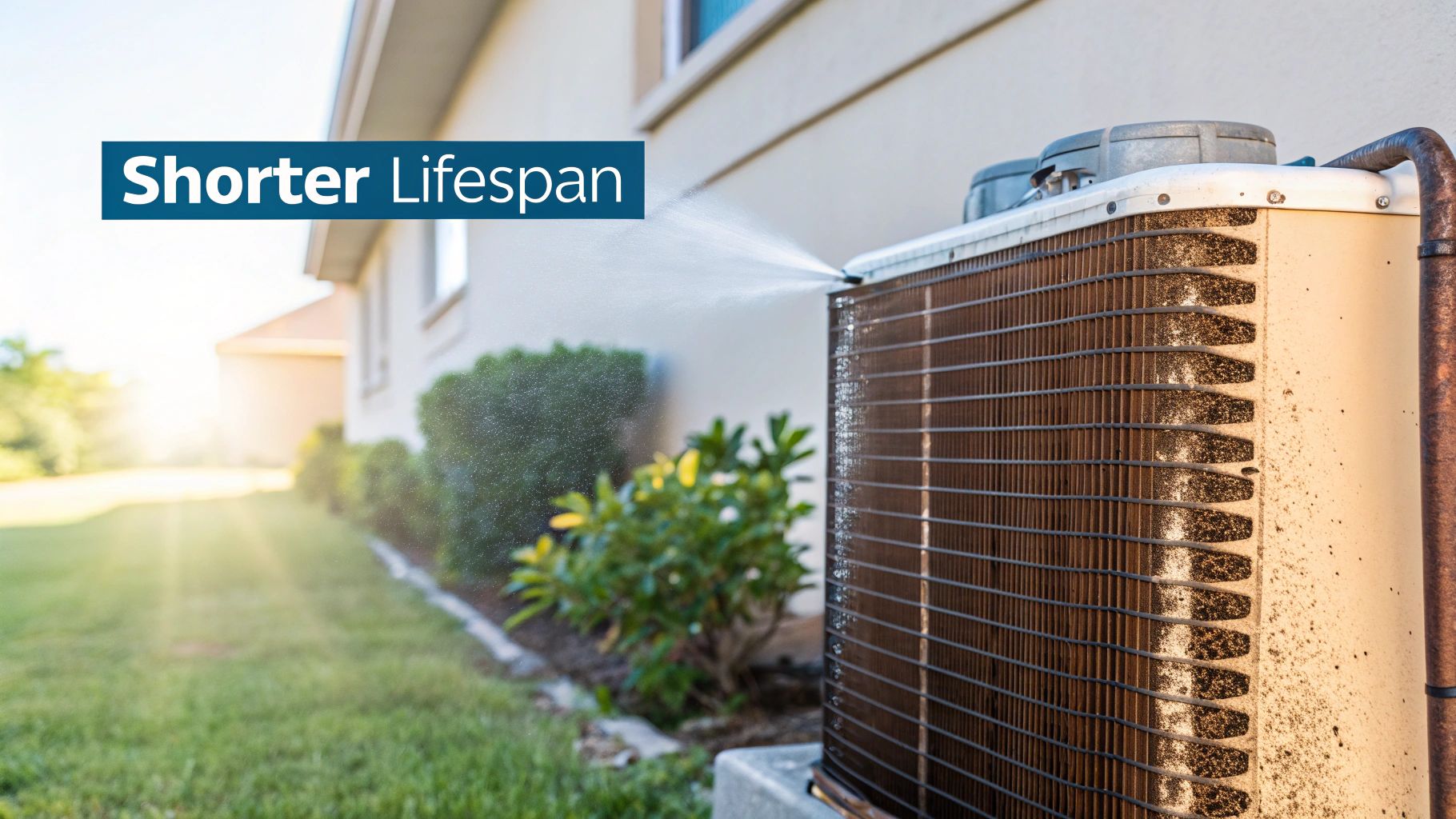
If you've ever felt like your air conditioner gave up the ghost years too soon, you're not imagining things. It's a common story for homeowners here. HVAC systems in the Sunshine State face a much shorter lifespan, and it has nothing to do with shoddy manufacturing.
The real culprit is the relentless, brutal battle your unit wages against the Florida climate every single day.
Our combination of intense heat, suffocating humidity, and corrosive salt air creates a uniquely punishing environment. Unlike systems in milder states that get a seasonal break, a Florida AC runs almost continuously for most of the year. This non-stop operation puts an incredible strain on every part, from the compressor to the smallest capacitor.
Think of it like a car. A vehicle used for a daily 100-mile commute through a blizzard will wear out much faster than one driven a few miles a week in perfect weather. Your AC is no different.
Florida’s Triple Threat Climate
Our climate attacks your air conditioner on three fronts. Each one compounds the damage from the others, which is why proactive air conditioner maintenance in Florida isn't just a good idea—it's essential.
- The Unrelenting Heat: Your AC's main job is to pump heat from inside your home to the outside. When it's over 90°F for months at a time, your system has to work overtime just to keep up. This extreme workload is a fast track to component failure.
- The Crushing Humidity: High humidity forces your AC to pull double duty. It’s not just cooling the air; it's also wringing out massive amounts of moisture. That extra effort puts a tremendous load on the evaporator coils and the entire cooling system.
- The Corrosive Salt Air: For anyone near the coast, salt is a silent killer. Invisible salt particles ride the breeze and settle on your outdoor unit, eating away at the metal components like the delicate aluminum fins and copper coils.
The constant stress from our climate means that while a typical HVAC unit might last 15-20 years nationally, Florida systems often tap out much sooner. It’s a simple matter of a much harder working life.
What This Means for Your AC's Lifespan
This relentless demand takes a serious toll. The numbers don't lie: the average life expectancy of an HVAC unit in Florida is shorter than the national average by about 5 to 7 years.
While a well-maintained system elsewhere might hit the two-decade mark, it’s common for Florida units to need replacement around the 8-year mark if they’ve been neglected. You can find more details about Florida HVAC lifespan on buehlerair.com.
This reality is exactly why a strict maintenance schedule is so critical. Regular tune-ups help fight back against the damage, clean off corrosive buildup, and keep the system running as efficiently as possible under the strain.
Beyond maintenance, it's also smart to think about protecting your investment financially. Unexpected failures can be costly, so looking into options like equipment breakdown insurance can provide peace of mind. Ultimately, proactive care is your best defense to get the most years out of your system.
What to Expect from a Professional AC Tune Up
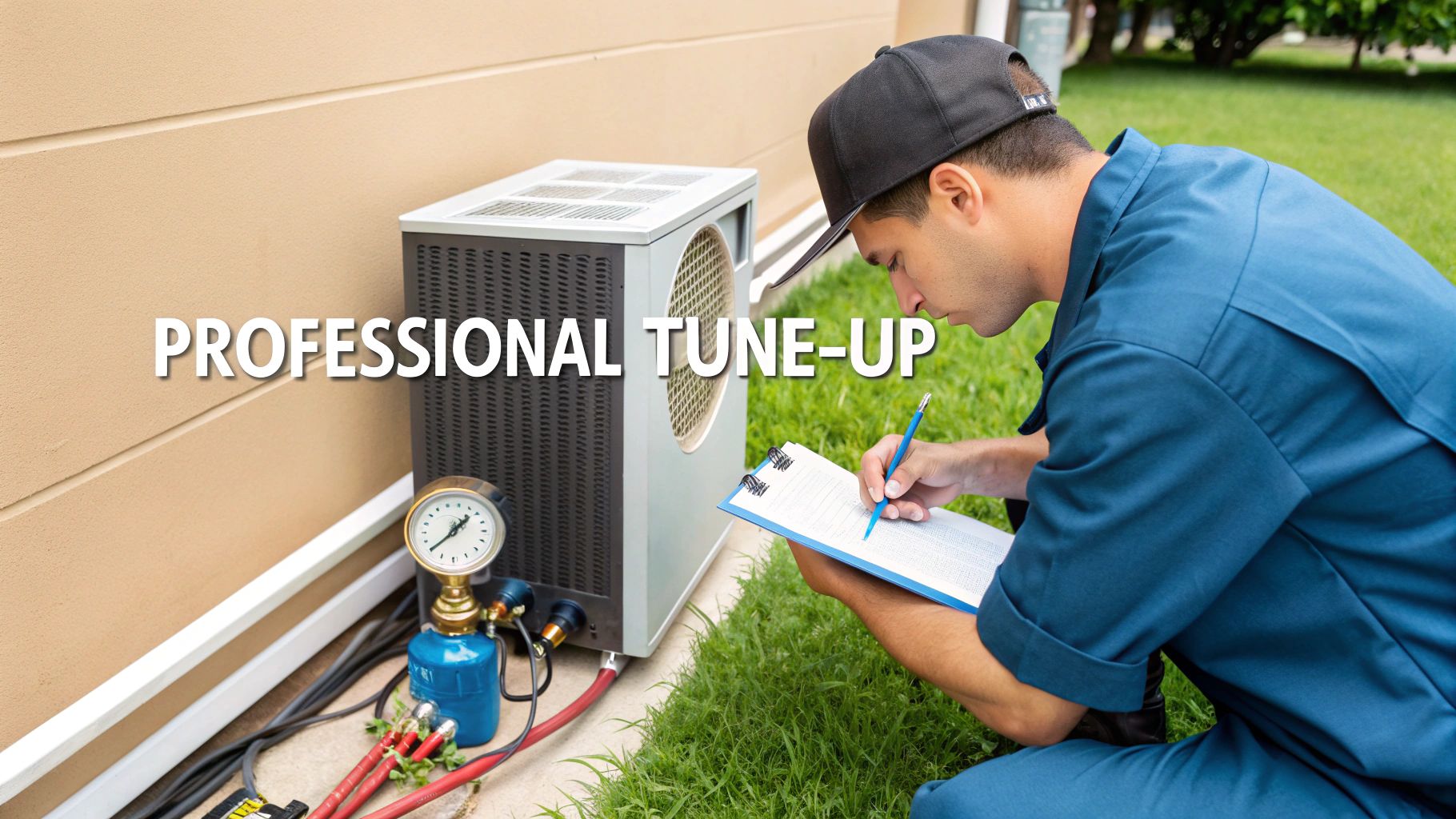
While your own DIY efforts are a great first line of defense, there are just some things that require a trained eye. A professional tune-up for air conditioner maintenance in Florida isn't just a glorified filter change; it's a deep dive into your system's health, getting it ready to face our brutal summers head-on.
A legitimate service call is about much more than a quick cleaning. It's a meticulous inspection that zeroes in on the high-stress parts of your AC that our climate punishes the most. When a good technician shows up, they should be prepared to spend a solid chunk of time performing a multi-point inspection, not just be in and out in 20 minutes.
Beyond the Basic Checklist
A true professional tune-up goes far beyond a simple checklist. It's an active process of testing, measuring, and calibrating to make sure every component is working in perfect harmony—something that's absolutely critical for efficiency in Florida's demanding environment.
You should expect the technician to tackle several key tasks:
- Inspect and Clean Coils: This is a big one. Both the indoor evaporator and outdoor condenser coils need a thorough cleaning. Clogged, grimy coils are one of the top reasons for poor performance and eventual system failure.
- Check Refrigerant Levels: Low refrigerant doesn't just mean your AC won't cool as well; it’s a red flag for a potential leak. A pro will measure the pressure and, if it's off, start looking for the source of the problem.
- Test Electrical Connections: This is a major safety check. Loose or corroded wires aren't just inefficient—they're a serious fire hazard and can cause expensive components to fail. Every connection, capacitor, and relay needs to be inspected and tightened.
A lot of people think AC tune-ups are a waste of money. The reality is, a single visit can spot a failing capacitor or a slow refrigerant leak, saving you from a much bigger bill—and a sweltering house—when it finally gives out on the hottest day of the year.
Evaluating Service Plans vs. One-Time Calls
Here in Florida, homeowners often wonder whether it’s better to get an annual service plan or just call for a one-time tune-up. A single visit is better than nothing, but a maintenance plan usually offers more bang for your buck. These plans often include more comprehensive checks, priority scheduling (a lifesaver in July!), and even discounts on parts.
Given how hard our systems work year-round, that continuous peace of mind is invaluable. If you're weighing the options, you can explore our detailed breakdown of how much air conditioner service costs.
In Florida, annual air conditioner maintenance plans typically run between $150 to $300, which almost always covers two visits per year. It's a smart investment here, as the constant high heat and humidity really accelerate wear and tear. A good plan will include a 21- to 26-point inspection and repair discounts, helping you keep your AC running at its best and hopefully avoiding those dreaded mid-summer breakdowns.
How New HVAC Rules are Changing the Game in Florida
The air conditioning world is on the brink of a major shift, and if you live in Florida, you'll feel the effects firsthand. New federal rules are changing the game for the refrigerants used in our AC systems, and it’s going to impact everything from a simple repair to buying a brand-new unit. This isn't just boring industry talk—it's a real-world change you'll want to get ahead of.
For a long time, the go-to refrigerant has been R-410A. Chances are, it's what's cooling your home right now. But because of its impact on the environment, the Environmental Protection Agency (EPA) is phasing it out for all new equipment. Your current system is fine, but the way we repair and replace ACs is about to look very different.
Get Ready for A2L Refrigerants
Starting in 2025, all newly made air conditioners must use refrigerants with a much lower Global Warming Potential (GWP). The new front-runners are R-32 and R-454B. You'll hear these called A2L refrigerants, which simply means they're a lot kinder to the planet and more energy-efficient, though they are classified as mildly flammable.
This is a great move for the environment, but it has some practical consequences for homeowners like us.
Here's the bottom line: You don't need to rush out and replace your current AC. But as manufacturers stop making R-410A, the price to fix refrigerant leaks in older systems will almost certainly go up. Scarcity drives up cost—it's simple economics.
What This Means for Your AC Maintenance and Future Upgrades
This change is a big deal everywhere, but especially in Florida, where our ACs run nearly year-round. These new regulations, part of the American Innovation and Manufacturing (AIM) Act, are clear: as of January 1, 2025, any new AC unit sold must use a refrigerant with a GWP under 750. To put that in perspective, the old R-410A has a GWP of 2,088. That’s a huge improvement. You can dive deeper into Florida's evolving HVAC trends at inletfl.com.
So, how does this affect your wallet and your home?
- If you have an older AC: Is your unit creeping up on that 8-12 year mark? In Florida, that's getting pretty old. If it needs a major repair, pouring a lot of money into a system that uses expensive, soon-to-be-obsolete R-410A might not make sense. It’s often smarter to put that repair money toward a new, hyper-efficient A2L system instead.
- If you're buying a new unit: When replacement time comes, you'll be getting a system built for these new refrigerants. Not only are they better for the planet, but they're also designed to be more efficient, which should translate into some welcome relief on your monthly FPL bill.
Keeping these changes in mind as you plan your air conditioner maintenance in Florida will save you from sticker shock down the road. It helps you make a smart, informed choice when it's finally time to upgrade.
Your Top Florida AC Maintenance Questions, Answered
Living in Palm Beach County, we hear the same questions over and over again from homeowners. And it makes sense—our heat and humidity put air conditioners through a unique kind of stress. I’ve put together some straightforward answers to the most common things we get asked, drawing from years of hands-on experience in the field.
Think of this as a quick troubleshooting guide, covering everything from strange sounds to that sticky feeling you can't seem to shake.
My AC Runs All Day, But My House is Still Hot. What's Going On?
This is easily one of the most maddening AC problems, especially when a July heatwave hits. If you can hear your system running constantly but the air just isn't getting cool, it’s usually a classic case of restricted airflow or a refrigerant problem.
Before you panic, check the easiest fix first: your air filter. A filter that’s completely choked with dust and debris can literally suffocate your AC, making it impossible to move cool air through your home. If you pull it out and it's clean, the issue is likely deeper in the system.
Other common culprits we see include:
- Dirty Evaporator Coils: When these coils get covered in grime, they can’t do their job of absorbing heat from the air passing over them.
- Low Refrigerant: This is a big one. Refrigerant isn't like gas in a car; it doesn't get "used up." If your levels are low, it means you have a leak somewhere in the line.
- An Undersized Unit: Sometimes, the system just isn't big enough for the house. If it wasn't sized correctly from the start, it will always fall behind on the hottest Florida days.
What’s the Best Thermostat Setting for Florida?
Ah, the great thermostat debate. Finding that sweet spot in Florida is all about balancing comfort with your energy bill. Of course, everyone has their own preference, but setting the temperature too low is a recipe for high costs and unnecessary strain on your system.
For the best mix of comfort and efficiency, we always recommend setting your thermostat to 78°F when you’re home. It’s a temperature that keeps most people comfortable without forcing the AC to work overtime. When you head out for the day, nudging it up a few degrees can make a real dent in your monthly bill.
A smart thermostat is a total game-changer for Florida homes. It learns your routine and adjusts the temperature for you, saving money without you even thinking about it. In our climate, it’s an investment that pays for itself in no time.
Why Does My House Feel So Humid, Even With the AC On?
Besides cooling, your air conditioner's most important job is pulling moisture out of the air. If your home has that sticky, clammy feeling, it’s a red flag that your system isn't dehumidifying properly. More often than not, this points to an AC unit that's too big for the house.
It sounds strange, but an oversized system cools the air too fast. It hits the target temperature on the thermostat and shuts off before it’s had a chance to run long enough to remove all that swampy humidity. This constant starting and stopping, known as short-cycling, is incredibly inefficient and leaves your home feeling uncomfortable. This is why getting the right size unit is so critical here in Florida.
Don't let AC trouble ruin your day. For honest diagnostics and service you can count on in Palm Beach County, the team at Florida Cooling Group has your back. You can schedule your professional maintenance visit today and get your system running right.
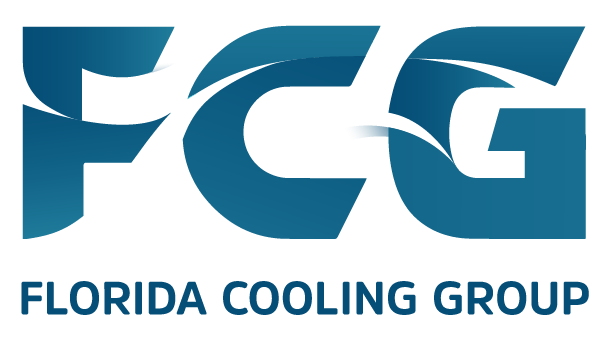
 (561) 400-2205
(561) 400-2205